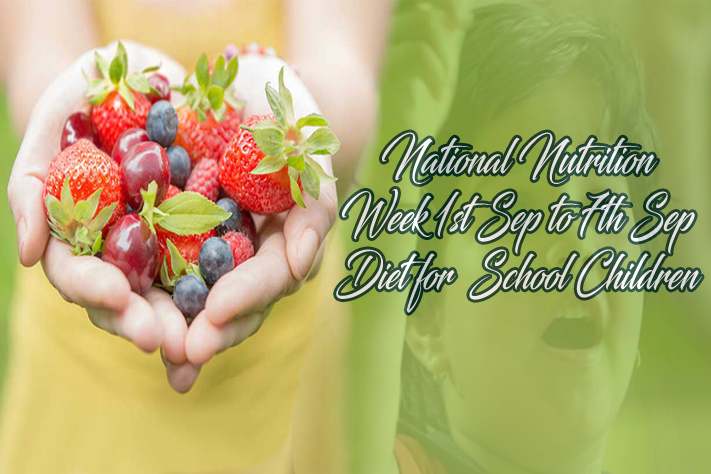National Nutrition Week 1st Sep to 7th Sep Diet for school children

Dr. Preethi Sharma, Consultant Pediatrician, KIMS Cuddles, Kondapur. Information Shared about Diet for school children Maintaining a balanced diet is very important for  school-aged children. But long school hours, the struggle to get the child ready on time makes it a huge challenge for most parents. Poor nutrition compromises both the quality of life of school-aged children but also their potential to benefit from education. Attaining optimal nutrition involves eating three meals a day and two nutritious snacks, as well as limiting the intake of high sugar and other junk food. The goal is also to prevent obesity which is increasing at an alarming rate in India.
school-aged children. But long school hours, the struggle to get the child ready on time makes it a huge challenge for most parents. Poor nutrition compromises both the quality of life of school-aged children but also their potential to benefit from education. Attaining optimal nutrition involves eating three meals a day and two nutritious snacks, as well as limiting the intake of high sugar and other junk food. The goal is also to prevent obesity which is increasing at an alarming rate in India.
Child should eat breakfast every day. Skipping breakfast leads to poor concentration and energy levels. Many schools also provide breakfast. The breakfast should include milk, some form of cereal, fresh fruits. Parents can give children a handful of nuts along with this.
Make sure your child eats a variety of foods in order to have adequate nutrient intake.
Choose a diet with plenty of grain products, vegetables and fruits.
Give the child a big bottle of water for school and insist that they finish at least that much in school. Teachers should also give regular water breaks. Many times children suffer from constipation, urine infections because of poor water intake.
Water cannot be substituted by fruit juices etc
For snacks include at least one fruit every day. Frequent snacking may result in loss of appetite during the main meal. A healthy snack should be less in size or quantity to the amount of a regular meal and taken at least 2 hours before a regular meal. Avoid salty snacks and sugary snacks. Many Indian parents give biscuits during snack time – they are a very bad choice.
Snacks sent to school should be based on the same principles.
Choose a diet low in fat, saturated fat, and cholesterol.
Make sure growing children get a good protein diet everyday eggs/ daals/ chicken/fish/ soya or other protein-rich food.
Avoid giving large amounts of sweet desserts, soft drinks, fruit-flavored drinks, sugarcoated cereals, chips or candy, as they have little nutritional value. And these junk foods are a big cause of obesity.
Eating out should be restricted to just one meal in a week or 2 weeks. The latest trend in big cities is to eat out for 3-4 meals in a week particularly weekends. This is a very unhealthy practice. Home cooked food is the best for children. Make sure you choose the right food for your child while eating out. Do not let them binge on high sugar content food and other high-calorie foods.
In case the child is not eating well at school or getting back the tiffin, do not shout at them or punish them for that. This may result in your child lying or throwing away the remaining food.
Children should be educated about healthy food choices from a very young age. Parents should pack their tiffins based on the child's preferences also. They should be involved in the decision of what they want to take for school lunch. This results in a higher chance of the food being finished in school. There can be a reward system for finishing their school food.

 Disclaimer: Welthi.com does not guarantee any specific results as a result of the procedures mentioned here, and the results may vary from person to person.
Disclaimer: Welthi.com does not guarantee any specific results as a result of the procedures mentioned here, and the results may vary from person to person.









